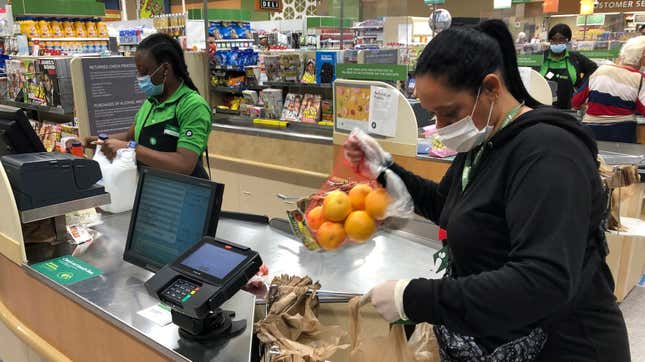
After the proposal received unanimous support from the city council, Seattle Mayor Jenny Durkan last Friday signed in local ordinance 119799, the seemingly unimpeachable purpose of which was to impose “premium pay” for gig workers delivering groceries during the ongoing pandemic. Not even a week later, the city is being taken to court by Instacart, as well as the Washington Food Industry Association, a local grocery advocacy group, over the ordinance.
Many companies have been unwilling to provide hazard pay for essential employees during this health crisis—and many that did have rescinded or obfuscated those increases. For gig workers, who are classified as contractors, the situation can be even more dire. As the ordinance notes, these individuals often “work in high risk conditions with inconsistent access to protective equipment and other safety measures; work in public situations with limited or no ability to engage in physical distancing; and continually expose themselves and the public to the spread of disease.” Seattle’s solution was to legislate hazard pay in the form of premiums based on the number of stops a given driver has to make.
Under 119799, these workers are entitled to an additional $2.50 for their first stop, and another $1.25 for every subsequent stop on each and every order. Considering most Instacart orders involve going to a grocery store and then delivering the specified goods to a customer’s home, an added $3.75 or more per order might help alleviate some of the economic anxiety experienced by contingent workers during These Unprecedented Times.
Instacart and the WFIA, however, argue that the new ordinance is “unlawful” and “invalid,” pointing to a prior ballot initiative, I-1634, which barred any “local governmental entity” from imposing taxes or fees on groceries. Crucial to the wording of the initiative, those fees and fines barred not just the “manufacture” or “sale” of food items but their “transportation” as well.
“We believe what they are calling their premium paid ordinance violates initiative 1634, which the voters overwhelmingly passed,” Jan Gee, president and CEO of WFIA, told Gizmodo. I-1634 passed in 2018 at least in part because of more than $20 million in spending supplied by WFIA, Coca-Cola, Pepsi, Keurig, Red Bull and others. At the time, the initiative was referred to as “undemocratic” and “an industry-funded campaign to prevent cities from enacting taxes on soda.” The final vote tally of 55.88% for, 44.12% against, while ultimately enough to pass, may not meet everyone’s definition of “overwhelmingly.”
“We’re disappointed that the Seattle City Council and Mayor Durkan chose to disregard the needs of Seattleites in the midst of a global health crisis and widespread economic hardship,” Instacart wrote in a statement to Gizmodo. “This legislation is a blatant overreach of power, violating state and federal constitutional law and requiring food delivery network companies to unsustainably subsidize service in Seattle for years to come.” Instacart also cited I-1634 as precedent for its rebuke of the new ordinance, claiming, “This legislation also exceeds the City’s jurisdiction by attempting to commandeer private businesses, forcing them to essentially operate as public utilities for three years after the civil emergency ends.”
Within the text of the lawsuit itself, however, Instacart and WFIA also claim the ordinance violates “the Fifth and Fourteenth Amendments of United States Constitution under the Takings and Equal Protection Clauses” and “an unconstitutional taking of private property without just compensation.” OK.
There does seem to be some merit to Instacart’s assertion that it will “suffer unsustainable increased operational losses in the Seattle market,” however. Part of the finer print in ordinance 119799 severely curtails how it, or any other gig company doing grocery delivery in the area for that matter, could offset the costs of this premium:
No hiring entity shall, as a result of this ordinance going into effect, take any of the following actions:
1. Reduce or otherwise modify the areas of the City that are served by the hiring entity;
2. Reduce a gig worker’s compensation; or
3. Limit a gig worker’s earning capacity, including but not limited to restricting access to online orders.
4. Add customer charges to online orders for delivery of groceries.
That said, Instacart, which is still a private, venture capital-backed affair, is worth an estimated $13.7 billion, and completed its 12th round of funding early last month—an additional $225 million infusion.
“It must have been pretty expensive to pay a bunch of lawyers to dream up these absurd arguments but apparently the company has money to burn—the coronavirus pandemic has made Instacart’s CEO a billionaire and goosed the company’s value up to $14 billion,” Working Washington, a pro-labor group that helped push for the new ordinance, wrote in a statement. “Meanwhile, the people taking on the risk of essential work during a global pandemic are getting paid less than the minimum wage after expenses. That’s why hazard pay is popular, necessary, appropriate, perfectly legal, and bound to expand from Seattle across the country.”
While WFIA and Instacart are seeking unspecified damages, largely their aim seems to be having a judge declare the ordinance illegal, and hitting pause on the associated premiums until that decision might be reached. It’s not clear whether 119799 will stand up to scrutiny, but Instacart may not have calculated how badly its stinginess toward essential workers may play in the court of public opinion.
The full text of the suit is below:
Updated to include comment from Working Washington